William Henry Ellis
"One of the most consummate villains that ever existed."
William Henry Ellis was born and baptised in Sandford, Devon in 1788. His parents were Josias and Mary and he had a younger sister Elizabeth (Betty). William and Elizabeth Ellis were two of the children presented bibles at the East Village school in in 1798. (East Village, where they probably lived, although part of Sandford Parish, was closer to Stockleigh English to the North.)
In May 1825 Elizabeth Ellis died aged 35 in Twickenham, Middlesex, but was buried at Stockleigh English. In August that year her father Josias died aged 69. He too was buried at Stockleigh English.
On Tuesday 6 Sep 1825, a few days after his father's funeral, William Ellis was arrested at his employer's shop at 182 Fore St, Exeter. Some details appeared in the Exeter Flying Post two days later:
A greater sensation was excited in this City, yesterday, than we recollect for many years, by the discovery of an embezzlement of cash and notes to an unheard of extent by Wm Henry Ellis, a confidential shopman and clerk in the employ of the very respectable house of Newman & Co. grocers. – He underwent last evening a long, private examination before the Magistrate, and was remanded, with orders to be brought up again at 10 o’clock this morning, ...when he was fully committed for trial. - The plunder by this man seems to have been systematic, and carried on for years, during which he has accumulated, in boxes, cash and notes to the amount of nearly Six Thousand Pounds, which was seized at his lodgings... The prisoner conducted himself with great effrontery during the examination and while being taken to prison coolly made some remarks on the weather; he is short in stature, and has rather a feminine appearance.
Newman & Co
Ellis had been employed by John Newman from about 1811, initially to teach his children to write. He later worked in Newman's shop where he gradually took on more responsibility.
(Since about 1600 the Newman family, from Dartmouth, where John was born, had been involved with trade between there, Newfoundland and Portugal. Cod from Newfoundland was traded with wine and port from Portugal.)

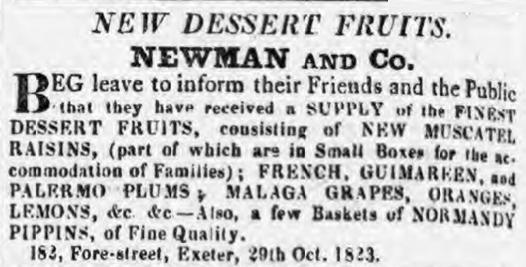
John Newman had died in Alphington on 11 May 1822.
In his will he left to Mr Ellis “a Gold Watch Chain, as a remembrance - he is so well off in Money Matters to what the others are that a trifle in this way may be more acceptable.”
After his master's death, Ellis continued working in the business for Susan Newman, the widow.
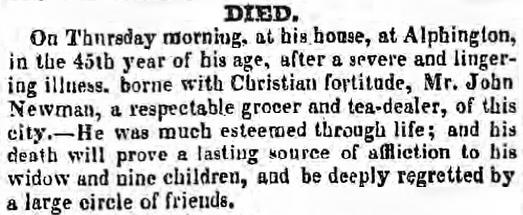
At that time the Newmans started to suspect that Ellis was stealing from the shop. They set a trap for him by placing marked coins in the till. After his arrest, his lodgings were searched. A large amount of cash was found. Cheese and soap, allegedly stolen from Newman's shop was also discovered in Ellis's mother's house in Sandford.
Ellis was remanded and appeared at the Exeter City Sessions on 13 Oct 1825. His hearing took place in a crowded court in the Guildhall.
He was charged on six counts of stealing or embezzling:
"to wit: the sums of 6 shillings - 6 pence - 14 shillings - a promissory note value £1 - 2 papers of greats - cheese and soap, to which he pleaded “not guilty”
His barrister brought from London, John Adulphus, requested an adjournment as he and his client had had short notice of the charges he was facing. So the trial was adjourned until the Epiphany sessions in January 1826.
On 9 Jan 1826 The Guildhall court was again crowded to excess.
Ellis was first charged with embezzling a sixpence, the property of Susan Newman and her family.
Francis Cornish Newman, her son, told the court that on 6 September he had marked a sixpence and arranged for George Webb to take it to the shop and ask Ellis to change it for six pennies. This he did. Francis Newman says he saw Ellis take the six coins from the till. He then obtained a summons. Ellis was searched by a constable and the marked sixpence was found in his pocket.
Ellis did not speak in his defence and was found guilty by the jury.
He was next charged with stealing one shilling belonging to the Newmans. Francis Newman told the court that he had placed nine marked silver coins in the till on the morning of 6 September. When the constable searched Ellis six of the marked shillings were found in his waistcoat pocket.
In his defence Ellis read a written statement. He started by claiming that he had been denied access to the books and papers needed to prepare his defence. He gave an explanation for how he came to have the marked coins and then several character witnesses were called.
The Jury after a few minutes returned a guilty verdict. He was sentenced to one month’s imprisonment for the first offence and 14 years’ transportation for the second.
His lawyers suggested he should appeal on the grounds that a 14 year sentence was not permitted for the proven offence.
Right:
Ellis's signature on his petition to appeal his sentence
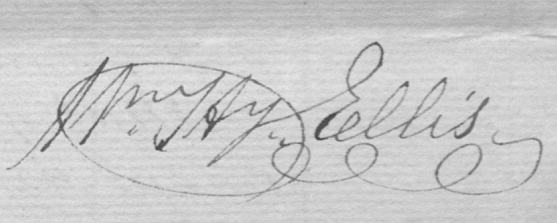
He was taken in chains to Newgate Gaol in London in February 1826, pending his appeal at the King's Bench: "In passing from the prison to the coach the prisoner was hissed by the populace". The Judges of the King's Bench allowed his appeal in June so he was sent back to Devon for retrial.
This took place on 27 July. Four charges were preferred:
First, stealing cheese and soap, found in his mother’s house in Sandford. This was dropped and he was found not guilty.
Secondly, stealing the six marked shillings: he was found guilty and was ordered to be sent back to the King's Bench for sentencing. (The other charges were not proceded with.)
Nov 25 1826 King’s Bench: The sentence of the Court, therefore, is, that you, William Henry Ellis, be transported beyond the seas, for the term of seven years, to such place as his Majesty, and with the advice of his Privy Council, may be pleased to direct; and that in the mean time you be committed to the custody of the keeper of his Majesty’s jail of Newgate. The prisoner was then removed from the bar; but almost immediately brought back by order of the Court.
Mr. Justice Bayley : You are brought back again, in order that the officer of the Court may call upon you to pray the benefit of clergy, which had been omitted.
Mr. Dealtry : Prisoner, what have you to say that the Court should not proceed to past judgment of death, and award execution against you?
Prisoner: I leave it to counsel.
Mr. Justice Bayley: Your counsel cannot now say any thing for you: you must kneel down, and pray your benefit of clergy. The prisoner having knelt down accordingly,
Mr. Justice Bayley once more repeated the sentence of the Court, and the prisoner was removed from the bar.
He was transported to Tasmania in April 1827 on the "Governor Ready", arriving at Hobart at the end of July. He seems to have kept out of trouble, and was granted his free pardon in July 1832. The following month he married Harriet Vincent, who had come to Tasmania with her parents. He was 44, she was just 18. They settled in Green Ponds (now called Kempton). Her father, Cornishman John Vincent owned a couple of licenced hotels and possibly set Ellis up in business. Ellis ran the Commercial Hotel (also known as Ellis's or Green Ponds Hotel) which later became their family home. As his fortune increased he acquired other property both in Tasmania and Victoria. William and Harriet had 12 children.
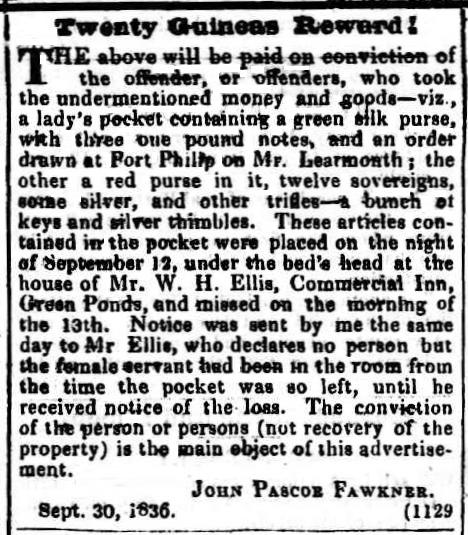
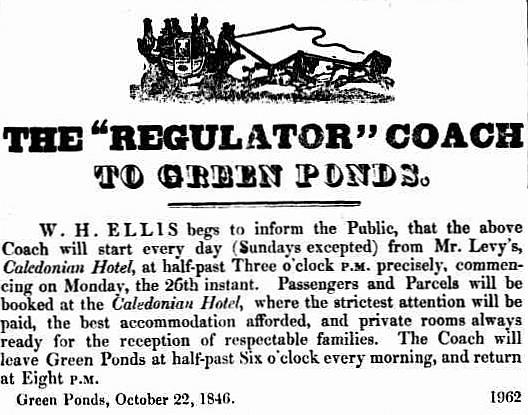
William Ellis also ran a coach service between his hotel in Green Ponds and Hobart.

William Ellis died a wealthy man in 1860, aged 62.
Right: the Ellis Family grave at Kempton (Green Ponds).
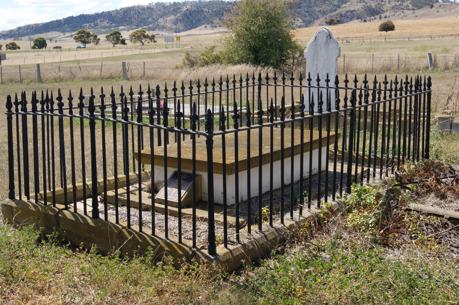
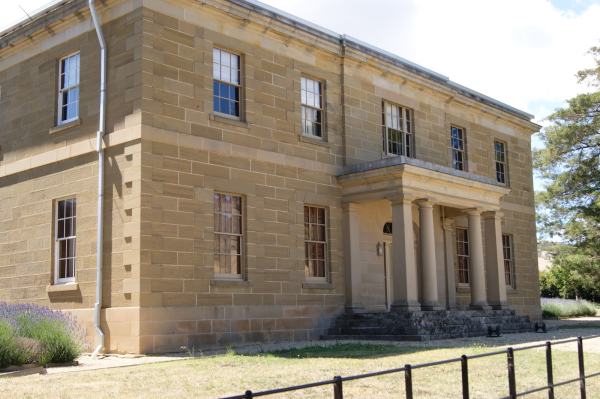
Ellis's Hotel in Kempton (Photo kindly supplied by Geoff Ritchie).
It is now called Dysart House, and is in private ownership. It was reputedly built for Ellis in about 1840, in which case it replaced a previous hotel building.
1870 sales description right
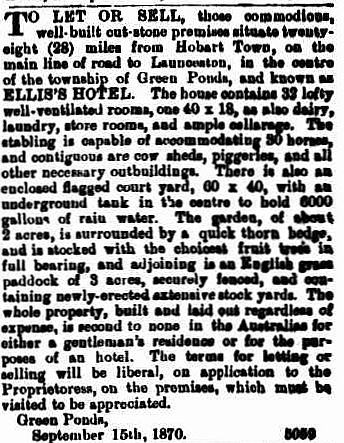
Back in Sandford, Devon, William Ellis's mother became ill in 1829. She wrote her will on 18 February, leaving all her effects to her son William "now in van Diemen's Land". This amounted to £27 in the Exeter Savings Bank, and £40 in the care of her executor, George Guppy of the Swan Inn in Crediton. There was a proviso that should her son never return to England, then the same George Guppy was "to enjoy everything that belongs to me". She died on 25 April 1829 and was buried with her husband and daughter in Stockleigh English. There are no records to suggest that William came back to collect his legacy.
The final chapter in this story took place in 1833 when the Newman family tried to obtain the proceeds of Ellis's crime. They claimed he had defrauded them of £10,000. About £6000 (today's equivalent is about £30,000) was found in his house. Roughly half of this had been returned to the Newmans, the rest was retained by Exeter City Corporation. In the enquiry that followed William Henry Ellis was described thus:
"Ellis appears to have been one of the most consummate villains that ever existed, even this increase-of-crime age. He was a single man of penurious habits, sleek, and steady in his demeanour, mild and unassuming in his manners, in outward appearance devotedly attached to his employer and his family, and was generally esteemed as a God fearing man, “being a regular attendant on a place of worship, and an occasional preacher”. He was apprehended with a sermon in his pocket."
The Newmans didn't get any more money returned.
by Peter Selley
